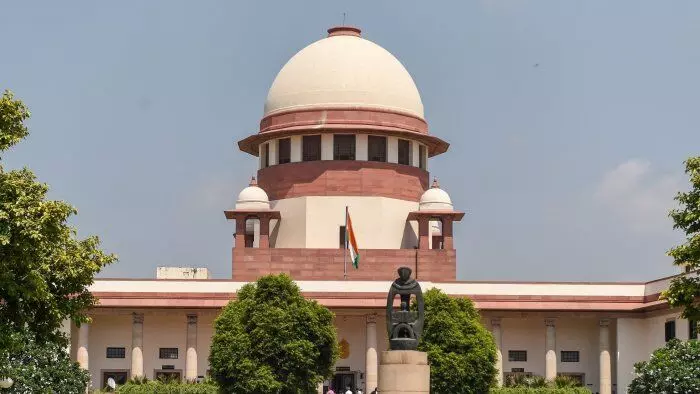SC gives 6 weeks to states for details on actions against lynching, cow vigilantism

New Delhi: The Supreme Court on Tuesday asked state governments to report within six weeks the measures taken regarding mob lynching and cow vigilantism incidents.
A panel comprising Justices BR Gavai, Aravind Kumar, and Sandeep Mehta scheduled a hearing six weeks hence, addressing a plea from a women’s group. This plea demands that states act promptly in line with the Supreme Court’s 2018 decision to effectively curb lynching and violence against Muslims by cow vigilantes.
The bench noted the absence of response from most states concerning mob lynching instances. “It was anticipated that the states would at least reply to the actions taken in such cases. We allocate six weeks for the states that have not yet responded to also detail the measures they’ve implemented,” the bench declared.
The plea under review was initiated by the National Federation of Indian Women (NFIW), associated with the Communist Party of India. Last year, notices were dispatched to the Centre and the DGPs of Maharashtra, Orissa, Rajasthan, Bihar, Madhya Pradesh, and Haryana for their input on the plea.
Advocate Nizam Pasha, representing NFIW, highlighted an alleged lynching in Madhya Pradesh, where the FIR was lodged for cow slaughter against the victims instead.
Pasha argued: “If the state denies the lynching, how will the 2018 Tehseen Poonawalla case verdict be enforced?”
The bench probed the Madhya Pradesh government’s counsel on the rationale behind registering an FIR for cow slaughter without meat chemical analysis and the absence of an FIR for those involved in the altercation.
The bench inquired: “Are you attempting to protect someone? How can an FIR for cow slaughter be registered without chemical analysis?” and requested incident specifics.
Pasha also mentioned a similar occurrence in Haryana, where a case was filed for beef transportation but not for lynching.
“The states are refuting any lynching incidents, and FIRs are being filed for cow slaughter against the victims. Only Madhya Pradesh and Haryana have submitted their affidavits regarding the incidents cited in the writ petition and interlocutory applications, while other states have yet to do so,” he stated.
The bench then issued its order.
Justice Kumar advised Pasha to include all incidents, not just those selectively from certain states.
“What about that tailor in Rajasthan... Kanhaiya Lal... who was lynched,” the court asked, to which Advocate Nizam Pasha, representing the petitioners, acknowledged it had not been mentioned.
Senior advocate Archana Pathak Dave, representing a state, pointed out that the writ petition specifically claims Muslim men are lynched, omitting other religious groups.
“The sought relief cannot be religion-specific,” she contended.
Pasha maintained that societal realities and incidents targeting specific communities are admissible in court.
The bench urged Dave to maintain composure in her arguments, emphasising, “Let’s not delve into religion-based incidents. We should concentrate on the broader issue.”
The Supreme Court scheduled the next hearing post-summer vacation, instructing states to submit their responses on steps to prevent mob lynching.
Previously, on July 28, the court consented to hear a plea addressing the “disturbing” surge in lynching and violence against Muslims, despite the court’s explicit 2018 guidelines concerning cow vigilantes.
The plea seeks a mandamus writ compelling state authorities to act immediately as per the court’s findings and directives in the Tehseen Poonawalla case to effectively manage the situation.
The 2018 ruling tasked states with the primary responsibility to prevent any form of vigilantism and provided guidelines for handling such events.




